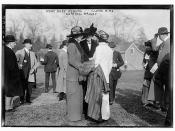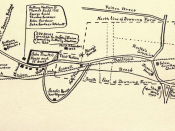Inner Conflicts
When people think of the word "conflict," things like a confrontation with a family member, a fight between two friends, or even a bloody war come to mind. However, oftentimes the most serious conflict lies within oneself. This holds true for Arthur Miller's The Crucible. Among the turmoil and disorder that encompasses the Puritans of Salem Village lie two characters who not only have to endure the hardships of the events in their town, but also are forced to struggle with their own personal battles. In the play, John Proctor is compelled to choose between saving his physical life by lying or saving his eternal life by being a martyr. Similarly, Mary Warren is faced with the decision to either come clean about the reality of the witch-hunts or keep living a lie. While both characters are confronted with life altering choices, it is John Proctor who ultimately stands up for his beliefs, while Mary Warren succumbs to the "hypnosis" of her peers.
John Proctor, an average puritan farmer, is faced with inner turmoil that plagues him every day. However, at first he is not only bothered by the events of the witch- hunt; his affair with seventeen-year-old Abigail Williams still lingers in his mind. It is evident that his wife, Elizabeth, distrusts him, so John is confronted with the arduous decision of whether or not to admit to his adultery. Yet, it is not until after John and his wife have been arrested for witchcraft that the pieces of his life begin to come together. Faced with possible death, Proctor emerges as a decent and noble man. Though he did not involve himself in any sort of witchcraft, John knows that he cannot be hanged and die a martyr with the sin of adultery still looming in...


